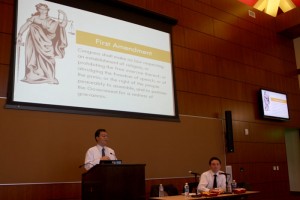Students curious about rules for free speech on campus
Students often invoke free speech to justify on-campus demonstrations, but there are no clear-cut guidelines for protection of free speech at USC, Stephen Yamaguchi, university counsel, said at the “Campus Conversation: Free Speech” panel held Tuesday.
Student Affairs and the Political Student Assembly sponsored the event, which was held in the Ronald Tutor Campus Center Forum.

Freedom · Stephen Yamaguchi (left), university counsel, and Peter Steinwachs, associate fellow at the Gould School of Law, spoke at the panel. - Jennifer Schultz | Daily Trojan
Yamaguchi and Peter Steinwachs, associate fellow at the Gould School of Law, led the discussion, which around 30 students and staff attended.
Yamaguchi and Steinwachs gave a presentation on the First Amendment, its history and its application to universities. Yamaguchi emphasized the interpretive nature of legal rights.
“All rights are not absolute, in the sense that there are many other considerations,” Yamaguchi said. “There are other interests who have other concerns that are also legitimate, such as the right to privacy and certain property rights.”
Free speech can only be restricted to serve a legitimate interest, and alternatives should be offered if possible, according to Yamaguchi.
“If a group of people picket in front of a library and people can’t get into the library and students need to do that, then we can move that group to a new location,” Steinwachs said. “This is a reasonable alternative.”
Yamaguchi said there were no specific guidelines for protesting on campus, but that students generally should avoid interfering with academic or business affairs.
“You’ve got to know what your rights are and stand up for [them],” he said. “It’s not easy, but that’s what you’ve got to do.”
Yamaguchi also led a question-and-answer session that revealed problems students had with the way free speech is currently handled at USC.
Some students said they wanted to know the specific guidelines for expressing free speech on campus to avoid problems.
Clayton Elliott, a junior majoring in economics, thinks the lack of clear guidelines is not a bad thing.
“A lot of these laws are laws you have to fight for yourself,” Elliott said. “Not everyone in the world is going to do everything they can to accommodate you.”
Heather Larabee, assistant dean of students and director of Campus Activities, said her department wants to make sure students are able to express themselves on campus by training all Dept. of Public Safety officers to carefully handle protesting students.
“It’s helpful if we know in advance, because then we can go to DPS and say, ‘We know this is happening, here’s a heads up,’” Larabee said. “We don’t want to interfere with an event, but we want both things to happen — we want the protest to happen and for the event to happen.”
Sherry Wang, a freshman majoring in creative writing, said she had hoped to learn more about the university’s specific guidelines regarding free speech.
“I came here because I wanted to see what the campus’s actual policies were, but I felt like the information they gave was actually kind of vague,” Wang said.
Yamaguchi said the frustration students feel about restrictions on their right to protest should energize them about their causes.
“I’m very encouraged when I can hear directly from students who are committed and passionate about their causes because it demonstrates that the university has a community that cares about what’s going on in the world,” Yamaguchi said.

Comments are closed.